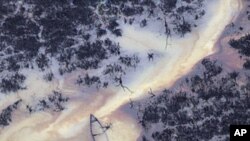The president of the movement for the survival of the Ogoni people (MOSOP) said Shell Oil’s acceptance of responsibility for two oil spills in 2008 and 2009 vindicates the Ogoni people’s claims that the company had been responsible for environmental degradation in the region.
Ledum Mitee said Shell Oil’s mea culpa and Thursday’s United Nations report on the magnitude and impact of oil spills in the Niger Delta prove that MOSOP’S non-violent agitation over the years can yield positive results.
‘We think it is a very welcome development. We applaud it, and we think that it is a victory for the Ogoni People and the non-violent approach that we have adopted in an environment that will appear most times that only the violent options attract attention,” he said.
MOSOP has struggled against the degradation of their lands by Shell in Nigeria for years.
It began its campaign with the 1990 Ogoni Bill of Rights, addressed to the federal government. Among the concerns listed in the bill were oil-related suffering of the Ogoni People and neglect by the federal government of Nigeria.
Mitee said the group feels vindicated by Shell Oil’s mea culpa.
“We feel completely vindicated, and the only regret is that it took a court in the United Kingdom to get Shell to admit its culpability in oil spills that we already knew that they were culpable for,” Mitee said.
Lawyers representing the Bodo community of Nigeria's Ogoniland region sued Shell in a British court. They said the oil company could pay out hundreds of millions of dollars in damages.
Mitee said Shell’s admission of responsibility would encourage other Ogoni groups to seek damages from Shell.
“Definitely, this presents a very good precedent. For several other communities, it will open a whole line of cases where people will feel that this is where they need to go, and more importantly, it sends the message that the non-violent option also has some rewards ultimately,” Mitee said.
In a report released August 4, the United Nations Environmental Program said drinking water supplies within Nigeria’s oil-rich Niger Delta have been damaged by 50 years of crude oil spills.
The United Nations report said decades of oil spills in Nigeria's Ogoniland region may require the world's largest petroleum cleanup that could cost more than $1 billion.
Mitee said the UN report confirms what MOSOP has said all along that there was a high level of environmental devastation in Ogoniland.
“We think that this is a very salutory development to the cause that our leaders and my friends who died many years ago stood for,” Mitee said.
He expressed regrets that the UN took four years and $10 million to say what the Ogoni People have been saying for years.
In November 1995, nine MOSOP activists, among them the playwright Ken Saro-Wiwa were hanged by the Nigerian government on charges of "incitement to murder".
Mitee said Shell’s admission of culpability is a good atonement to Saro-Wiwa and several Ogoni activists who died in the struggle.
“He [Saro-Wiwa] would feel fulfilled that some of those things that he stood for and Shell was always denying that there was environmental devastation, now scientifically have been proven, and he would feel vindicated, and I’m sure that several others who laid down their lives in this in this cause, that is a good atonement to their memory,” Mitee said.




